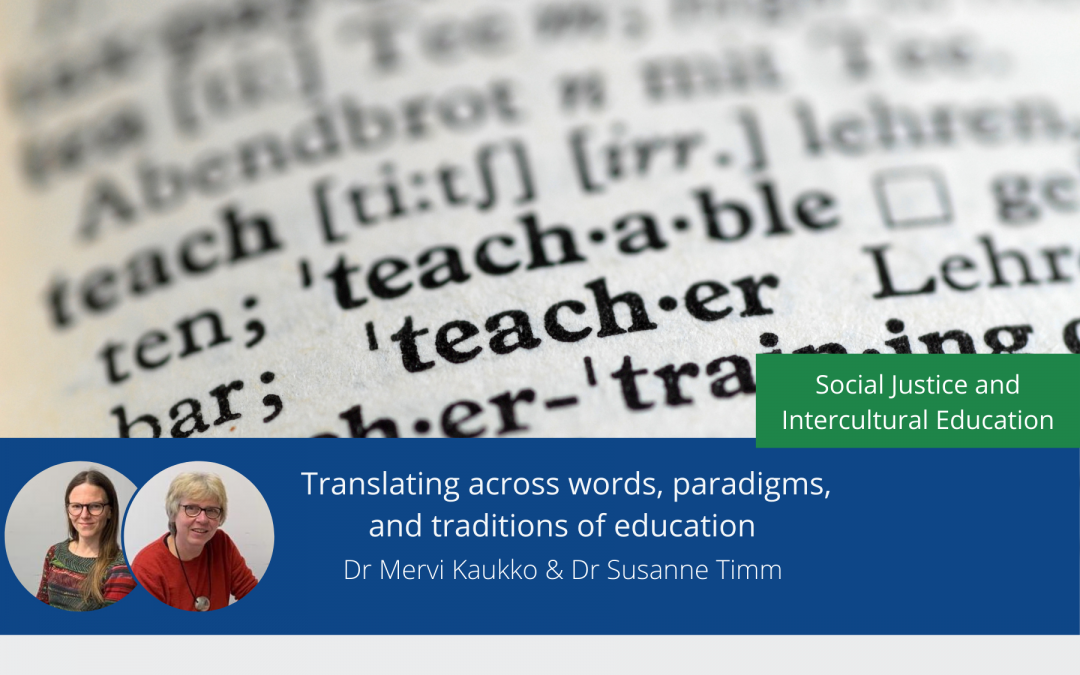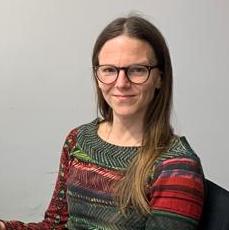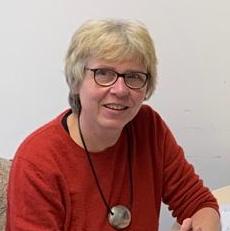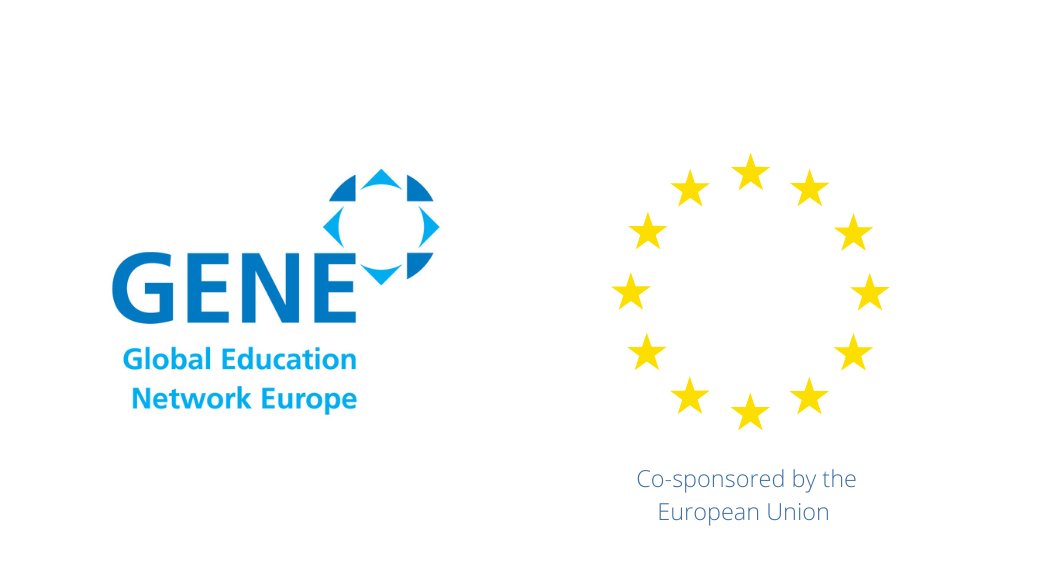
Translating across words, paradigms, and traditions of education
EERA is delighted and honoured to be partnering with the Global Educational Network in Europe (GENE) to make significant research funds available to our members to further research the area of global education. We asked the recipients of the Global Education Award 2020/21 to share their research with the broader EERA community.
At the beginning of 2021, the two authors of this blog, along with Finnish colleagues Inkeri Rissanen and Katri Jokikokko, received a Global Education Award from the GENE network. With this award, they promised to do something they were all passionate about: Explore teacher students’ implicit knowledge in issues related to global education and consider how teachers’ beliefs might play out in their future work as teachers.
As we write this blog a year after receiving the award, we are deeply immersed in data analysis in Bamberg, Germany, where Mervi is visiting Susanne. While delving into the data, we try to see if we can find harmony within the diversity of Finnish and German teacher students’ thoughts. Yet we find that we must also create harmony in our research practices, translating not only data in three languages but also our own implicit understandings of the educational traditions and research paradigms we may take for granted.
In our research, 32 Finnish and 35 German preservice teachers discussed issues related to diversity, culture, and change. All of the students had participated in a course focusing on these issues, and we hoped this shared experience would re-activate their common orientations. The groups conversed in three languages, Finnish, English, German, depending on the language of instruction of their course.
Our method, documentary analysis (Bohnsack, 2010), requires us not only to understand the literal meaning of words but go beyond it and understand the values behind words. This proved rather difficult to do in a group in which none of us spoke all three of the required languages. For less critical sections of the transcripts, we used transcription software. For crucial parts of our research, we hired professional translators. The software, trying to be helpful, created words that looked Finnish but made no sense. We were able to remove this nonsense with a lot of manual revision and discussions, but the trickier task was to translate the context-specific understanding behind the words.
Translation beyond words
Our analysis focused on concepts such as culture, diversity, or change, all loaded with meaning. For example, instead of translating the term diversity, Germans use the English word, but as a strictly normative concept, meaning plurality is a good thing. In Finnish, diversity can be translated as moninaisuus, but it has not yet found its way into natural everyday conversation. So, it is not surprising that it could rarely be found in the preservice teachers’ discussions. The fact that some terms are missing could be a methodological challenge: how can the students talk without these particular words? However, with the documentary method, it was not: after rounds and rounds of analysis and abduction, the discussions revealed the students’ orientations towards diversity without the word even being mentioned.
Translation beyond paradigms
The need to translate went beyond needing to agree on the literal meaning of words. We also had to translate our practices as researchers, making them compatible. Susanne works within a reconstructive paradigm, focusing on language. Mervi is most at home within participatory paradigms, with the analytical focus on practice. We soon found out that our attention points in the same direction, trying to find educational practices that can respond to the needs of the changing world; we just use slightly different lenses.
Translation beyond traditions of education
Finally, perhaps most interestingly, we translated our understandings across slightly different educational traditions. We share an interest in global education, but explicating what we mean by education, Bildung or kasvatus, was a fascinating task. The Finnish kasvatus and German Bildung are both complex terms describing educational processes and practices which are impossible to simply translate into English. We came to an agreement that Bildung is in line with our understanding of global education: it refers to the processes in which an individual acquires the needed skills and knowledge for individual growth and character formation (on an individual level), while also learning to be an active and critical member of their community (on a social level) to open up new possibilities for individual and shared lives (Kaukko, et al. 2020).
Experimenting with new research methods required us to problematise some of the ways of working we might take for granted. Multilinguality pushed us to scrutinise our understanding of some of the words we work with. Only working in and through English would have left some of the nuances in the shadows. All the steps pointed out very clearly that we need humans for all this as software cannot do this. Moreover, all these steps pushed us to consider the dimensions of global education in our own work. It is not enough to say that our research is framed within global education. We need to shape our research practices accordingly, so that we genuinely try to see the issues from another point of view.
A global education lens also requires us to reconsider our own responsibilities as researchers: What can we as educational researchers do to “open people’s eyes and minds to the realities of the world, and awaken them to bring about a world of greater justice, equity and human rights for all”? (Maastricht Global Education Declaration, 2002, see also 2018; Scheunpflug, 2021) A deeper understanding of the beliefs and orientations of preservice teachers, which could help us develop better, fairer, and more sustainable teacher education, is one way to pursue this.
Other blog posts on similar topics:
Blog Authors

Dr Mervi Kaukko
Associate Professor in Multicultural Education, Tampere University, Finland
Dr Mervi Kaukko works as associate professor in multicultural education in Tampere University, Finland. She was previously a lecturer at Monash University, Australia and Oulu University, Finland. Her interests include global education, refugee/migration studies, participatory methodogies and practice theories.

Dr Susanne Timm
Research Assistant, Otto-Friedrich-University, Bamberg
Dr Susanne Timm worked as a research assistant at the University in Göttingen, Frankfurt, Hamburg, and is currently at Otto-Friedrich-Universität in Bamberg. Her special interests are comparative and intercultural education. During the last years, Dr Timm has carried out a qualitative study on culture in teacher education while focusing more and more on global education.
GENE Awards

EERA is delighted and honoured to be partnering with the Global Educational Network in Europe (GENE) to make significant research funds available to our members to further research in the area of global education.
These research awards are funded by Global Education Network Europe (GENE), the European network of Ministries and Agencies with national responsibility for policymaking, funding, and support in the field of Global Education. For this reason, the subject area for research projects undertaken is that of Global Education.
The purpose of the award is to support quality research around the themes outlined here – which have been identified as of interest to policymakers. Gathering of existing research, application of existing research from other areas of education to Global Education, follow-up studies, all are perfectly acceptable. It is not expected that the research has to draw policy conclusions – but to make available up-to-date, policy-relevant research from which policymaker can draw their own conclusions.
References and Further Reading
Bohnsack, R. (2010). Documentary method and group discussions. In R. Bohnsack, N. Pfaff, & W. Weller (eds.),Qualitative analysis and documentary method in international educational research (p. 99-124). Barbara Budrich. http://nbn-resolving.de/urn:nbn:de:0168-ssoar-317339 https://www.ssoar.info/ssoar/bitstream/handle/document/31733/ssoar-2010-bohnsack-Documentary_method_an_group_discussions.pdf?sequence=1&isAllowed=y&lnkname=ssoar-2010-bohnsack-Documentary_method_an_group_discussions.pdf
Kaukko, M., Francisco, S., Mahon, K. (2020) Education in a world worth living in. In Mahon, K., Francisco, S., Edwards-Groves, C., Kaukko, M., Kemmis, S., and Kirsten P. (eds). Pedagogy, Education and Praxis in Critical Times. Springer, 1-13. https://link.springer.com/book/10.1007/978-981-15-6926-5
Maastricht Global Education Declaration (2002) A European Strategy Framework for Improving and Increasing Global Education in Europe to the Year 2015. Dublin: GENE. https://rm.coe.int/168070e540
Scheunpflug, A. (2021). Global learning: Educational research in an emerging field. European Education Research Journal, 20(1), 3-13.https://journals.sagepub.com/doi/full/10.1177/1474904120951743
